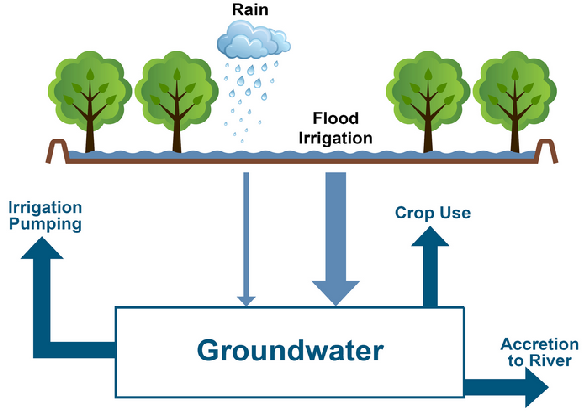Ahmedabad
(Head Office)Address : 506, 3rd EYE THREE (III), Opp. Induben Khakhrawala, Girish Cold Drink Cross Road, CG Road, Navrangpura, Ahmedabad, 380009.
Mobile : 8469231587 / 9586028957
Telephone : 079-40098991
E-mail: dics.upsc@gmail.com

Groundwater Depletion
News: Recently, an analysis of water level data done by the Central Ground Water Board (CGWB) indicates that about 33% of the wells monitored have registered decline in ground water levels in the range of 0 – 2 metres.
Details:
• Moreover, a decline of more than 4.0 m has also been observed in a few pockets of metro cities like New Delhi, Chennai, Indore, Madurai, Vijayawada, Ghaziabad, Kanpur, and Lucknow, etc.
• CGWB is periodically monitoring the ground water levels throughout the Country including metro cities on a regional scale, through a network of monitoring wells.
Indian scenario:
• The UNESCO World Water Development Report, 2018 states that India is the largest extractor of groundwater in the world.The contribution of groundwater to national gross domestic product is never measured.
• According to the CGWB, with 230 billion metrecube of groundwater drawn out each year for irrigating agriculture lands in India, many parts of the country are experiencing rapid depletion of groundwater.
• The total estimated groundwater depletion in India is in the range of 122–199 billion metrecube.
Factors responsible:
• Green Revolution enabled water intensive crops to be grown in drought prone/ water deficit regions, leading to over extraction of groundwater.
• Frequent pumping of water from the ground without waiting for its replenishment leads to quick depletion.
• Further, Subsidies on electricity and high MSP (Minimum Support Price) for water intensive crops.
• Water contamination as in the case of pollution by landfills, septic tanks, leaky underground gas tanks, and from overuse of fertilizers and pesticides leading to damage and depletion of groundwater resources.
• Inadequate regulation of groundwater encourages the exhaustion of groundwater resources without any penalty.In India, construction of irrigation wells does not require any clearance and no records are maintained of abandoned wells.
• Several hundred wells are constructed in India every day and even more are abandoned when they run dry.
• Water being a State subject, initiatives on water management including water conservation and water harvesting and making available adequate drinkable water to citizens in the Country is primarily States’ responsibility.
• However, important measures including funding of various projects are taken by the Central Government.
Steps taken in this direction:
• Government of India launched Jal Shakti Abhiyan (JSA) in 2019, intended to improve water availability including groundwater conditions in the water stressed blocks of 256 districts in India.
• CGWB in consultation with the state governments has prepared The Master Plan - 2020.It envisages construction of about 1.42 crore Rain water harvesting and artificial recharge structures in the Country to harness 185 Billion Cubic Metre (BCM).In addition, the government has also launched the Catch the Rain’ campaign to promote rainwater harvesting.
• National Water Policy (2012)policy advocates rainwater harvesting and conservation of water and highlights the need for augmenting the availability of water through direct use of rainfall.It also advocates conservation of river, river bodies and infrastructure should be undertaken in a scientifically planned manner through community participation.
• Atal Bhujal Yojana (ABHY) scheme (co-funded by World Bank funding, for sustainable management of ground water with community participation is being taken up in the identified over-exploited and water stressed areas.
• Central Government supports construction of water harvesting and conservation works primarily through Mahatma Gandhi National Rural Employment Guarantee Scheme and Pradhan Mantri Krishi Sinchayee Yojana – Watershed Development Component.
• The CGWB has taken up Aquifer Mapping and Management Programme.The program is aimed to delineate aquifer disposition and their characterization for preparation of aquifer/ area specific groundwater management plans with community participation.
• Atal Mission for Rejuvenation and Urban Transformation (AMRUT) focuses on development of basic urban infrastructure in the AMRUT cities, such as water supply, sewerage & septage management, storm water drainage, green spaces & parks, and non-motorized urban transport.

Address : 506, 3rd EYE THREE (III), Opp. Induben Khakhrawala, Girish Cold Drink Cross Road, CG Road, Navrangpura, Ahmedabad, 380009.
Mobile : 8469231587 / 9586028957
Telephone : 079-40098991
E-mail: dics.upsc@gmail.com
Address: A-306, The Landmark, Urjanagar-1, Opp. Spicy Street, Kudasan – Por Road, Kudasan, Gandhinagar – 382421
Mobile : 9723832444 / 9723932444
E-mail: dics.gnagar@gmail.com
Address: 2nd Floor, 9 Shivali Society, L&T Circle, opp. Ratri Bazar, Karelibaugh, Vadodara, 390018
Mobile : 9725692037 / 9725692054
E-mail: dics.vadodara@gmail.com
Address: 403, Raj Victoria, Opp. Pal Walkway, Near Galaxy Circle, Pal, Surat-394510
Mobile : 8401031583 / 8401031587
E-mail: dics.surat@gmail.com
Address: 303,305 K 158 Complex Above Magson, Sindhubhavan Road Ahmedabad-380059
Mobile : 9974751177 / 8469231587
E-mail: dicssbr@gmail.com
Address: 57/17, 2nd Floor, Old Rajinder Nagar Market, Bada Bazaar Marg, Delhi-60
Mobile : 9104830862 / 9104830865
E-mail: dics.newdelhi@gmail.com